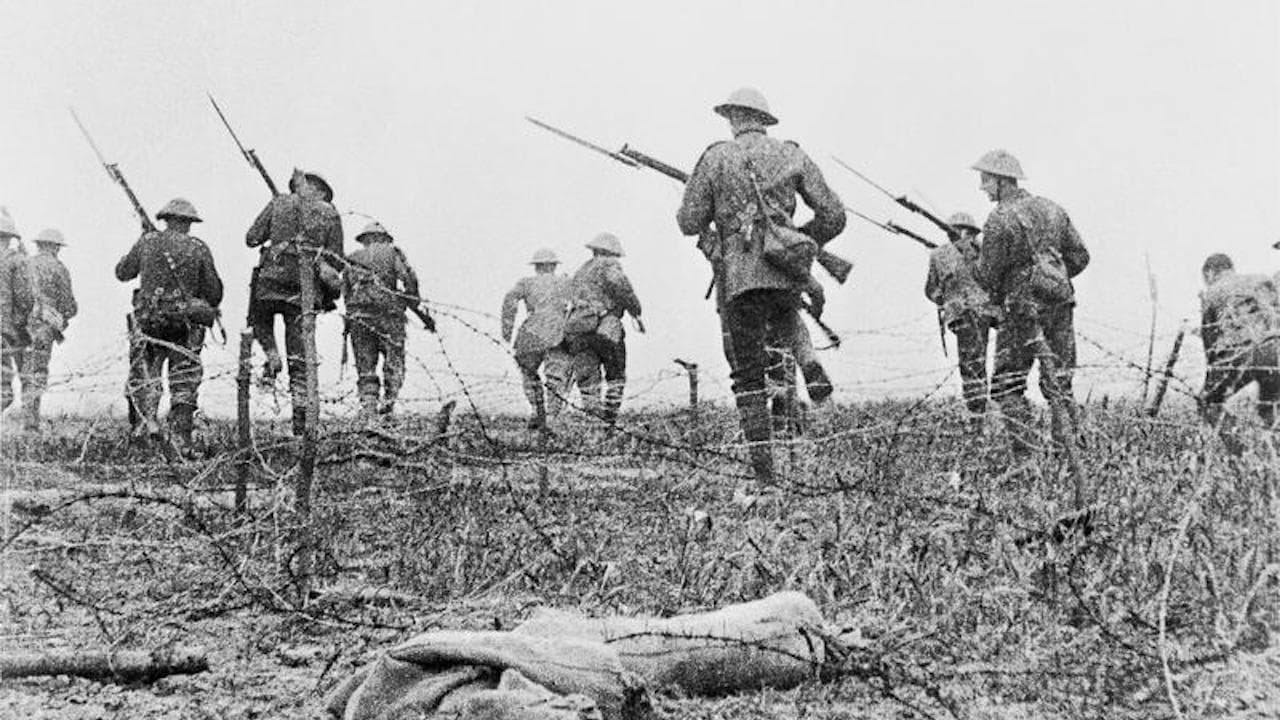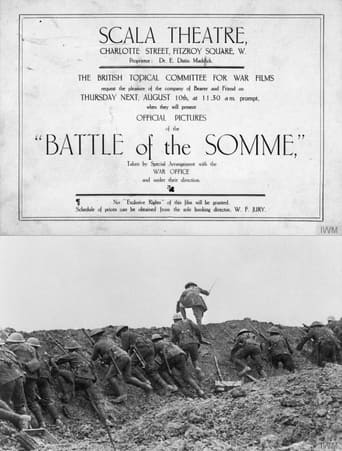

not as good as all the hype
... View MoreI wanted to like it more than I actually did... But much of the humor totally escaped me and I walked out only mildly impressed.
... View MoreThis movie tries so hard to be funny, yet it falls flat every time. Just another example of recycled ideas repackaged with women in an attempt to appeal to a certain audience.
... View MoreGreat movie. Not sure what people expected but I found it highly entertaining.
... View MoreYes some of these scenes were "Re-Enacted" for Propaganda/Enlistment purposes but let's not forget that every single soldier in this Movie, Documentary call it what you will are now dead, Most probably died at that time in that place or in later battles. Much footage was cut from the public version, as the War Office wanted the film to contain images that would support the war effort and raise morale.It still manages to portray the horrors of war and its utter futility, did we learn our lesson No,no we didn't This is a remarkable piece of Cinema that has now passed from living memoryLest We Forget
... View MoreLast night I went to the Queen Elizabeth Hall on the South Bank to watch a screening of the digitally restored print of this silent film, accompanied by the Philharmonia Orchestra, playing music written by Laura Rossi. I was nervous about the application of music to a silent film, as I am about the application of music to any film, but more so. Whilst there can be no doubt about the power of music to augment the impact of a scene, this manipulation of our emotions can also be crass, offensive, or a complete failure. There were times during this film when the music was the perfect partner - the rendering of the wind over the battlefield was incredible and terrifying. But the accompaniment of drum-bursts for the firing of artillery pieces was less-than-impressive. And there were moments when i wished the film would be left to speak for itself, such as the filming of the first charges; some men slid back down the muddy faces of the trenches, one thought initially because they had lost their footing, but it was soon clear that they had been killed before they had even set foot in no-man's land. For me, this moment would have been made powerful by silence, because there are no words or sounds for the sadness and futility of such things. Finally, on the music, the accompaniment of cheerful marching tunes when the lads marched back from "a successful attack", left me with a sour taste, but i think this says more about the film than the music. Laura Rossi could hardly provide sarcastic or barbed rejoinders (in the manner of Kipling or Sassoon's poetry) to these moments of propaganda. This is where the film falls down (but is still fascinating and valuable) in that, for the most part, it is content to talk up the British Army, the power of bombardment, and the success of its attacks. Even the images of dead men and horses are tempered by the smiling faces of 'jolly tommys' and the jaunty, cheery tone of the titles boards. What this unique visual record of the battle needs is to be seen in context, against the terrible losses of battalions such as the Accrington Pals, and the pitiful gains of this style of warfare. I never fail to be impressed, however, by the efforts of the institutions on the South Bank to bring amazing documents like this out of obscurity. Well done to them, and to Laura Rossi for her attempts to soundtrack this one-off film.
... View MoreThis is interesting from a historical point of view; it was released in 1916 as a propaganda film to get more people to join the army, as numbers were running low. So, they made the battle look much more nice and friendly as it is. For this reason then, it is excellent for History buffs.It is in black and white, and of course, made in 1916, during the war, contains some realism. However, don't watch this film if you want a real plot based thriller/drama, or anything that will rivet you in your seat.Honesly, I'd recommend this to anyone studying history, or interested in the topic, or who wants to own a piece of classic Brit propaganda. If you're at film school, it also might be quite nice to watch. Otherwise, watch a Kevin Spacey movie.
... View MoreThe documentary is a genre that was born at the same time as the cinema itself because at the beginning the cinematographer was there to reflect and capture daily events of varying degrees of importance: the arrival of a train to a station, the exit of the proletarian masses from the factories or even the exciting view of the parishioners going in and out of church. It followed that the new invention was a perfect instrument to display images, costumes and events that would interest older people as well as the new long haired generation.But "The Battle Of The Somme" it is not a trivial show of mundane events during the early times of the cinema; it is a document of a great importance for film history and history itself. The film depicts the terrible and largest WWI battle; it happened in a long front north and south of the River Somme in northern France and was a huge battle in which more than a million people from different nationalities died. The film is an exceptional document of the horrors of war that shows the great magnitude of that that tragic war or really any war. This conflict changed Europedrastically ( the end of the innocence ) and, even worse, rather than deter future wars, it only led the way to the even more terrible WWII. The film was photographed, not directed,-there is a big difference between those terms- by the British official cinematographers Geoffrey Malins and John McDowell whose primary intention was to film such an important battle but since they ended up shooting quite a lot footage, the British Topical Committee for War Films decided to release it as the first feature-length documentary film that depicts war combat. The film is structured and divided into different parts in which can be seen the different war preliminaries and the consequences of the battle, besides the tactics and arms used in the WWI. Since it was released during the war the movie functions as a propaganda film for the British Army. And of course it exposes to the civilians the horrors of war that was still raging. The film was shown in Great Britain and many countries of the world while the battles continued in France."The Battle Of The Somme" it is an exceptional war document of historical importance, a silent film that, although it seems a redundancy, doesn't need words.And now, if you'll allow me, I must temporarily take my leave, because this German Count wants to wish that those disasters of war never happen again.Herr Graf Ferdinand Von Galitzien
... View More